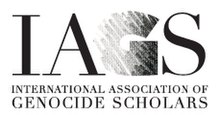
Back الجمعية الدولية لعلماء الإبادة الجماعية Arabic کۆمەڵەی نێودەوڵەتیی زانایانی جینۆساید CKB International Association of Genocide Scholars German Διεθνής Ένωση Μελετητών Γενοκτονιών Greek Internacia Asocio de Genocidologoj EO International Association of Genocide Scholars French האיגוד הבין-לאומי לחוקרי ג'נוסייד HE Asosiasi Internasional Peneliti Genosida ID Международная ассоциация исследователей геноцида Russian Міжнародна асоціація дослідників геноциду Ukrainian

The International Association of Genocide Scholars (IAGS) is an international non-partisan organization that seeks to further research and teaching about the nature, causes, and consequences of genocide, including the Armenian genocide, the Holocaust,[1] the genocides in Cambodia, Rwanda, Burundi, Bosnia-Herzogovina, Bangladesh, Sudan, and other nations. The IAGS also advances policy studies on the prevention of genocide.[2][3][4][5][6] The association's members consider comparative research, case studies, links between genocide and other human rights violations, predictive models for prevention of genocide, and tribunals and courts for the punishment of genocide. The organization's membership includes academics, anti-genocide activists, artists, genocide survivors, journalists, jurists, and public policy makers. Membership is open to interested persons worldwide.
The association has passed formal resolutions recognizing the Armenian genocide,[7][8] the Greek and Assyrian genocides,[9] and genocides in Darfur, Zimbabwe, by the Daesh in Syria and Iraq, genocide of Kurdish people[10] and the Rohingya genocide,[11] and also about former Iranian president Mahmoud Ahmadinejad's denial of the Holocaust.[12]

The official peer-reviewed academic journal of the association is called Genocide Studies and Prevention.[13]
- ^ "IAGS". Homepage. International Association of Genocide Scholars: History. Archived from the original on 11 September 2017. Retrieved 21 April 2017.
- ^ Forsythe, David P. (2009). Encyclopedia of Human Rights. Oxford University Press. pp. 4–. ISBN 978-0-19-533402-9.
- ^ Totten, Samuel (2007). The Prevention and Intervention of Genocide: An Annotated Bibliography. Routledge. pp. 1097–. ISBN 978-0-415-95358-0.
- ^ Totten, Samuel; Pedersen, Jon E. (January 2012). Educating about Social Issues in the 20th and 21st Centuries: A Critical Annotated Bibliography. IAP. pp. 422–. ISBN 978-1-61735-572-1.
- ^ Bartrop, Paul R. (30 July 2012). A Biographical Encyclopedia of Contemporary Genocide. ABC-CLIO. p. 389. ISBN 978-0-313-38679-4.
- ^ Ball, Howard (2011). Genocide: A Reference Handbook. ABC-CLIO. pp. 271. ISBN 978-1-59884-488-7.
- ^ Lewy, Guenter (15 April 2012). Essays on Genocide and Humanitarian Intervention. University of Utah Press. p. 5. ISBN 978-1-60781-187-9.
- ^ MacDonald, David B. (2008). Identity Politics in the Age of Genocide: The Holocaust and Historical Representation. Routledge. p. 135. ISBN 978-0-415-43061-6.
- ^ "International Association of Genocide Scholars" (PDF). Archived from the original (PDF) on February 27, 2008.
- ^ "Resolution to Declare that Massacres and Persecution of Iraqi Kurds were Crimes of Genocide and Crimes Against Humanity" (PDF). International Association of Genocide Scholars. Archived from the original (PDF) on 4 November 2023. Retrieved 4 November 2023.
- ^ Isenberg, Alexandra Suhner (2020-10-26). "Resolutions". International Association of Genocide Scholars. Retrieved 2020-11-21.
- ^ "Resolutions" (PDF). International Association of Genocide Scholars.
- ^ "IAGS Journal". Homepage. International Association of Genocide Scholars. Archived from the original on 15 September 2017. Retrieved 22 March 2015.